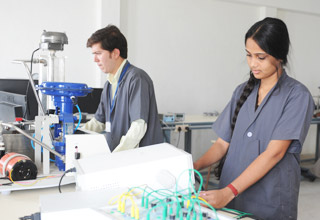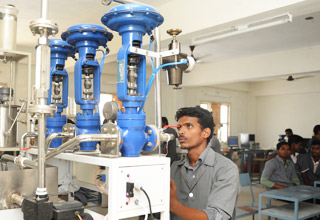| S.No | Faculty Name | Designation |
| 1 | Dr. P.K.CHIDAMBARAM | Professor & HOD |
| 2 | Dr. K.ALAGARRAJA | Professor |
| 3 | Dr.T.SURESH | Assistant Professor |
| 4 | T.THOMAS KOILRAJ | Assistant Professor |
| 5 | M.SHANMUGA KUMAR | Assistant Professor |
| 6 | Dr. S.SENTHIL BABU | Assistant Professor |
| 7 | VIGNESWARAN K S | Assistant Professor |
| 8 | Dr. BUCKSHUMIYAN. A | Professor |
| 9 | ANANDAN B | Lab Instructor |
| 10 | M.JOHNSON | Lab Instructor |
Mechanical Engineering is one of the largest and most versatile programmes with various applications virtually in every field and industry. Of all the engineering disciplines, mechanical engineering is the most diversified branch, which offers largest selection of career paths. The department of mechanical engineering has hard working and dedicated faculty members with illustrious educational and industrial backgrounds.

The department comprises of facilities to practice carpentry, smithy, welding, plumbing, and lathe Operations. Labs enhance the graduates’ knowledge and interest in the ever expanding terrain of engineering and technology. State-of-art labs encompass of all fluid power machineries like Francis Turbine, Pelton Wheel, Kaplan Turbine, Centrifugal Pump, Reciprocating Pumps and Gear Pumps. High Quality Experimental Set ups to determine pipe friction, Head Loss, and Flow through Orifices are available.
The equipments and machineries in the lab include 2 stroke & 4 stroke petrol and diesel engines. These Machineries are handy in conducting performance tests and load tests. The cut section models available in the lab helps the students to study in detail about the I.C engines. They are on par with the requirements of the modern day automobile industry. This Lab has 30 personal computers with sophisticated configuration, LAN administered, having a work station as the server, and with internet connection in each system. The systems are loaded with high end design software having an in built manufacturing module. It is also true that this lab of ours is decorated by the presence of 15 machines supporting all vital operations with precision. The presence of capstan lathes adds feather to the crown. This lab makes a direct impact in the minds of the future technocrats about the Industry.
The other labs of the department are:
- CAD/ CAM lab
- Dynamics lab
- Metrology and Measurements lab
- Engineering practices lab
- Manufacturing Technology lab – i
- Manufacturing Technology lab – ii
- Mechatronics lab
- Thermal Engineering lab – i
- Strength of Materials lab
- Thermal Engineering lab – ii
- Fluid Mechanics lab

The department has conducted its symposium function on 05.09.2015 and that was inaugurated by Prof. Iniyan, Department of Energy Studies, CEG Campus, Chennai. The events of the programs were paper presentation, machinist, CAD modelling, water rocketry, connections, truss masters and gaming. Winners have been recogonized with awards and certificates. Mr. Lakshmi Narayanan, Deputy Manager, Prothious, Chennai, delivered a speech with respect to recruitment aspects and competitiveness in mechanical fields to the budding engineers.
The department has its own association and through which, many programs had been scheduled. The events of the association were AIME, Mechior Fletz and national level technical symposium. AIME was inaugurated by Dr. S. Sampath kumar, Professor, Central workshop, Anna Univeristy , Chennai. Mechior Fletz was inaugurated by Dr. M.S. Shunmugam, Professor & HOD, IIT madras. The students of mechanical engineering have visited various industries as part of their industrial visit programs. Some of the industries are Renault Nissan, TVS Sundaram Fasteners, North Thermal Power Station, Combat Vehicle Research and Development etc.,
The Mechanical Engineering Department of New Prince Shri Bhavani College of Engineering and Technology will build our students into technically expert and ethically ideal professionals, promoting innovation and leadership qualities.
- To impart the quality education to construct effective Mechanical Engineers to serve our society
- To impart the knowledge in the field of Design, Thermal, Manufacturing and Automation to produce the quality of Mechanical Engineers.
- To improve the research activities of the students.
- To facilitate team work culture and to improve the social standards and quality of life of the graduates.
- To improve communication skills to excel in higher studies and placements.
PEO1: Have a successful career in Mechanical Engineering and allied industries.
PEO2: Have expertise in the areas of Design, Thermal, Materials and Manufacturing.
PEO3: Contribute towards technological development through academic research and industrial practices.
PEO4: Practice their profession with good communication, leadership, ethics and social responsibility.
PEO5: Graduates will adapt to evolving technologies through life-long learning.
Engineering graduates are expected to,
- Put on the knowledge of basic science and fundamentals of engineering to the solution of compound engineering problems.
- Acquire knowledge of identifying, formulating and solving complicated engineering problems.
- Design and accomplish experiments for complex engineering problems that meet preferred needs with suitable constraints such as social, political, environmental and economical aspects.
- Become assertive in applying recent engineering practices and soft tools including calculating and modeling to complex engineering actions with apt skills and sources.
- Be devoted to professional ethic responsibilities and socio economic standards.
- Communicate skillfully with engineering community as well as with society on engineering proceedings and able to engrave valuable report and expressing themselves in research of scientific community.
- Perform effectively as an individual and as leader or member in distinct panel of multidisciplinary environment.
- Settle in instant for global changes and modern-day practices.
- Aware of financial aspects of professional activities and projects with controlling cost and time.
- Realize life-long learning throughout the professional career.
PSO1: An ability to apply knowledge of mathematics and engineering sciences to develop mathematical models for industrial problems.
PSO2: An ability to identify, formulates, and solves complex engineering problems with high degree of competence.

Dr. SURESH. T
Assistant Professor

